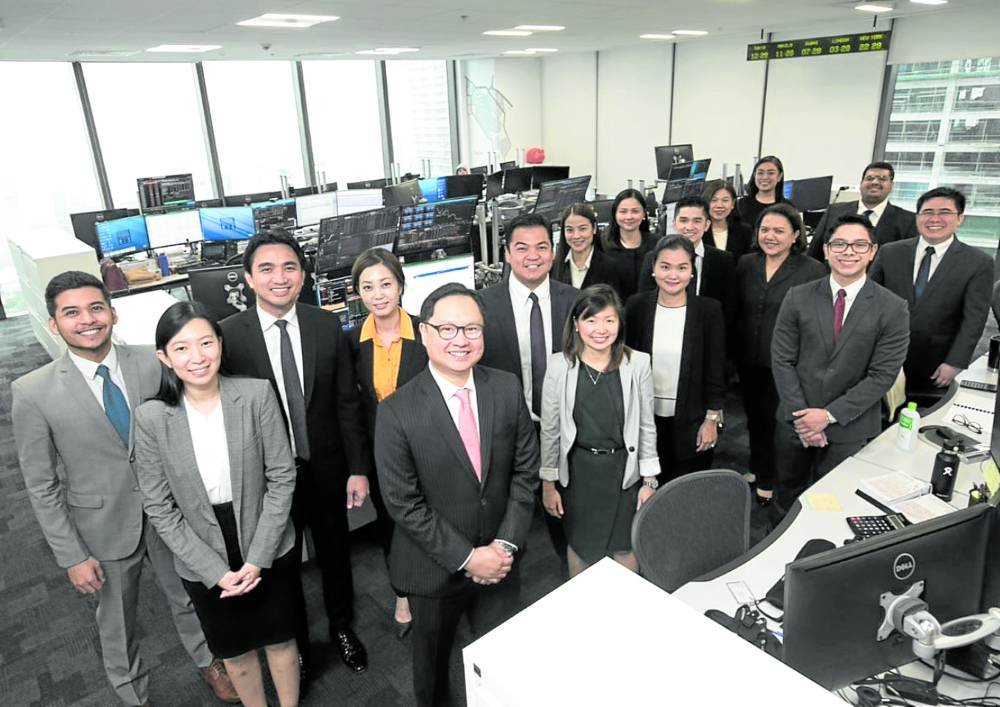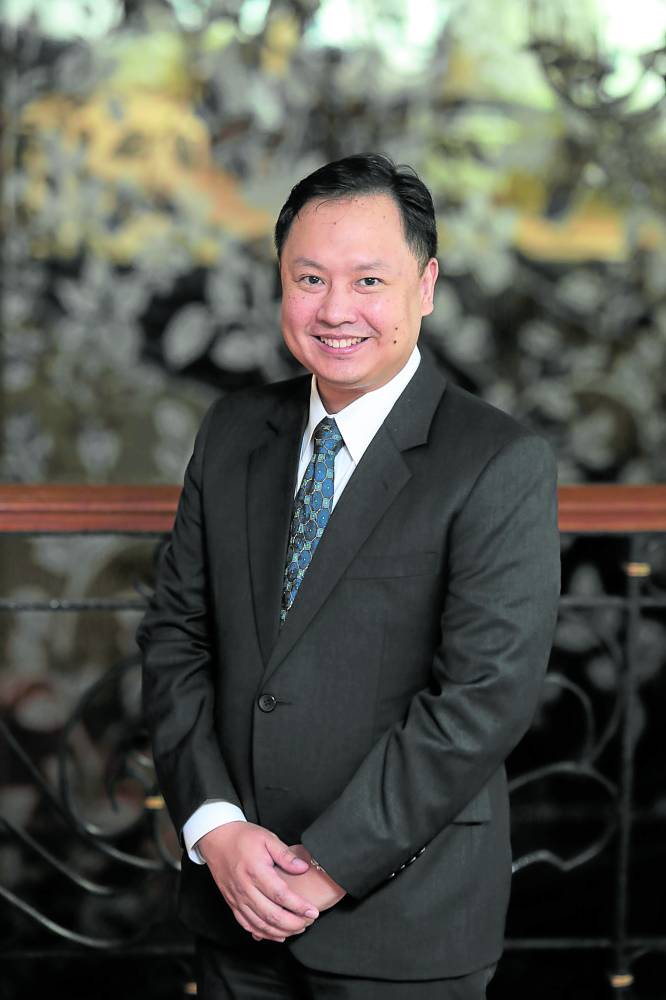Why not? PH can be ‘the next financial hub’

DEALING ROOM. Paul Favila (center) with his longtime tribe: Citi Philippines markets team. —Contributed photo
He is almost reluctant to discuss his dream for the Philippines, fearing that some people may think he’s a nut case.
But in his heart, Paul Favila, Citi Philippines’ first Filipino CEO in 35 years, believes that this country has what it takes to be a regional financial center.
All we need is to invest more in transport infrastructure to better connect the archipelago with the rest of the world, the 51-year-old banker tells the media.
“We already are a servicing hub globally, which means we are properly piped in to the rest of the world from a technological perspective. So if you have the transportation setup and it’s efficient to get in and out of the country—you have extremely good talent and that, I have a first-hand view on, seeing our operations and how everybody who comes here is just wowed by the quality of the people and excellent command of the English language—the Philippines can become the financial hub for the region,” Favila says.
With all the snowballing concerns about political freedom in Hong Kong, the former British colony is seen losing its luster as investors’ haven.
“Singapore is our only competitor, because it has been there preparing for decades, and of course, it’s easier to control things there,” he says.
But the city-state, which is just about the size of Cebu, is “bursting at the seams” in terms of infrastructure buildup and could only reclaim so much land, he notes. It also needs to import manpower.
“So there is a case to be made for the Philippines to become more than just a services hub, but a financial services hub,” he says, especially these days when virtual meetings have become normal. With the communication infrastructure already in place and local talent on the ground, he is certain that the country could make a pitch for it.
“Whatever I can initiate from a Citi perspective, I will try to influence and hopefully, if I am successful, we can share that story with others and really make my pipe dream a reality at some point,” he adds.
Favila is unfazed even by the country’s current “gray list” classification by Paris-based Financial Action Task Force, which means it needs to improve antimoney laundering and counter-terrorism financing safeguards. But he has faith that Filipino politicians will legislate what is needed, even amend the stringent bank secrecy rule, to get off the gray list.
The Indian model
Back in the 1980s, when Singapore was just starting out, the Philippines was a key location for Citi, Favila notes. The American banking giant’s Asia-Pacific Banking Institute was even located here.
“But more importantly, from a markets or treasury perspective, the Philippines was the hub for financial markets for Asia,” he says. “That’s an important piece of history that I would like our employees to know and understand, to get more pride. But it also is something that I would like the Philippines to again occupy, the Filipino aspect of it, for a global organization to view the Philippines as a high-value location.”
Favila has been studying the Indian growth model, how this populous nation became a global technological hub. He reckons that it’s mostly due to overcapacity in communication/telephone lines that was eventually harnessed, and when technology evolved, they used it to develop their internal capabilities.
“Just looking at how India is evolving, I think we are on the same path, and that’s why it’s important that we upgrade our services industry to something of higher value,” he says.
The country, after all, is strategically located to be a gateway to the Asia-Pacific, he adds.
“Thailand is positioning itself as the regional hub from a transport perspective. Of course you have Singapore doing the same and you have Malaysia always trying to outdo the two. Why not the Philippines? We’re literally building four airports, one right next to each other (referring to the Ninoy Aquino International Airport modernization, Bulacan, Clark and Sangley projects). At some point, it would look like overcapacity, but if used properly, I’d like to believe that a few years from now, we won’t have the logistical challenges that we have, and we can position to the next level,” he says.
Furthermore, he says the language capability and service orientation of Filipinos, along with the improved telecoms infrastructure, should support this dream.
“We love talking about the Philippines having slow internet. It is not true. It’s just a question of how much you’re willing to pay. If you pay for the right access, you will get very fast internet that is at par with everybody else in the region,” he says.

Paul Favila, Citi Philippines CEO
Right-sized
When Favila joined Citi 30 years ago, he recalls the bank had a headcount of no more than 1,500. It has since then become a much larger organization, employing 7,000 people even after the sale of its retail and consumer banking businesses to UnionBank. Of its current manpower, 6,000 comprise professionals from Citi Solutions Center or its global service centers.
“At this point, we’re sort of right-sized in terms of headcount. Of course, if you take a look at our metrics, we have an extremely efficient business on the ground,” he says. “Our institutional business is an extremely efficient business. And we see a lot of opportunity for client-led growth.”
The divestment has given the local banking unit much more focus on the institutional banking business, which has always been its bread and butter anyway, he suggests. Citi, which set up shop in this country in 1902, now serves more than 950 multinational corporations and 100 top local corporations.
The country head role of Citi has expanded significantly over the years and Favila is the first Filipino CEO to oversee the institutional businesses and the bank’s growing service center operations.
“I couldn’t have gotten this job at a better time. We’ve gone through a [COVID-19] crisis and as they always say, you can only go low so much. If this had happened earlier, it would have been a more daunting story,” he says. He is grateful that his predecessor, Aftab Ahmed, had held the fort during the pandemic.
‘Homeboy’
Although Favila was born in a family of bankers—he is the son of banking veteran Peter Favila, a former Monetary Board member and Trade Secretary—he initially didn’t want to follow in his footsteps. At the Ateneo de Manila University, he majored in brand management. But after graduating in 1993 and getting a job offer from one of the big brands, he could not imagine himself pursuing such path. He instead started sending his resume to banks.
“I guess it’s in the blood. You can’t escape your fate,” he says.
He joined Citibank in 1993 as assistant portfolio manager for Citibank Global Asset Management. From there he assumed various roles at Citi Markets, ranging from fixed income sales, equity derivatives sales and structuring and foreign exchange/local markets trading.
Prior to assuming responsibility for Citibank Manila’s trading business in 2004, he was part of the first batch of the Citibank Asian Tiger Program. He spent a year at the Citi hub in Singapore and Malaysia dealing rooms before heading back to Manila to assume leadership of the trading business, which he ran for 10 years up to 2014.
From 2015 until recently, he headed the markets business of Citi Philippines and until 2021, was also responsible for securities services. One thing that made him different from most bankers is that he wanted to excel in this job without moving to more developed markets like New York. From the start, he had made it his goal to build a career at a global bank operating in the Philippines and “give it a Filipino flavor.”
The Asia Tiger program had allowed him to try for a full year in 2003 how it’s like to live as an expatriate, but it only strengthened his resolve to stay in the country. “I’m a homeboy,” he proudly declares.
With increased connectivity via technology and air travel, Favila says there’s a lot of global networking opportunity now without having to be an expat.
On a personal note, he also chose to stay home because his sister has settled in the United States early on. By default, he says someone has to remain here to look after his parents.
When we point out that his dad doesn’t seem to age and probably doesn’t need him to run errands for them, he says in jest, “Kasi ako ang tumatanda (It’s because I’m the one who is growing old).”
It’s from his charismatic dad that he must have learned how to relate well with people. Despite his busy schedule, Favila keeps his door open for people who need mentorship, recalling how he himself has benefited from Citi’s culture of magnanimous mentorship. He is also a big supporter of inclusivity programs. He co-chairs Citi’s Diversity, Equity and Inclusion Council and despite not being a woman, he previously co-chaired the Citi Women’s Network.
The position of country chief he clinched after undergoing a competitive selection process.
One can surmise that this homeboy’s rise at Citi, the first and only company he has worked for (a “lifer” as they say), has been largely achieved by his own design.
“I wanted to prove something else — that the local can continue to progress, even if a person stays local. And that’s why this role that I have right now is a testament to that. You don’t have to be an expat to make it to the big leagues. And, in my heart, I did work for the country.”
Read Next
Subscribe to INQUIRER PLUS to get access to The Philippine Daily Inquirer & other 70+ titles, share up to 5 gadgets, listen to the news, download as early as 4am & share articles on social media. Call 896 6000.
For all the latest Business News Click Here
For the latest news and updates, follow us on Google News.



